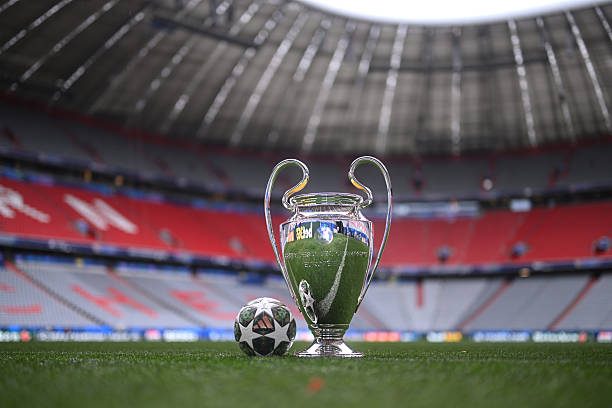
The 2025-26 UEFA Champions League marks the second season of the revolutionary 36-team format that replaces the traditional group stage with a single league phase. This edition promises heightened excitement as defending champions Paris Saint-Germain aim to retain their title against Europe’s elite clubs.
The tournament schedule spans nine months of intense competition.
- League Phase: September 16, 2025 – January 28, 2026
- Knockout Playoffs: February 2026 (for teams finishing 9th-24th)
- Round of 16: March 2026
- Quarterfinals: April 2026
- Semifinals: May 2026
- Grand Final: May 30, 2026, at Puskás Aréna in Budapest
The final matchday on January 28, 2026, will feature all 36 teams playing simultaneously across 18 matches, creating a dramatic conclusion to the league phase.
Table of Contents
UEFA Champions League 2025-26 Teams and Seeding Structure
A total of 36 elite clubs from across Europe have qualified for the competition, with representation from 15 different national associations. The seeding pots were determined based on UEFA club coefficients over five seasons of European competition performance.
| Association | Number of Teams | Teams |
|---|---|---|
| England | 6 | Manchester City, Liverpool, Chelsea, Arsenal, Tottenham, Newcastle |
| Spain | 5 | Real Madrid, Barcelona, Atlético Madrid, Athletic Club, Villarreal |
| Italy | 4 | Inter, Juventus, Atalanta, Napoli |
| Germany | 4 | Bayern Munich, Borussia Dortmund, Bayer Leverkusen, Eintracht Frankfurt |
| France | 3 | PSG, Marseille, Monaco |
| Other | 14 | Benfica, Sporting CP, Porto, Club Brugge, etc. |
This season welcomes Kairat Almaty from Kazakhstan as historic debutants in the league phase after they stunned Celtic in the playoffs.
UEFA Chamions League Draw Mechanics and Process Explained
The UCL draw employs a hybrid system combining manual elements with computerized randomization. The process unfolded as follows:
- Manual Draw: Former football stars Zlatan Ibrahimović and Kaká presided over the ceremony. Ibrahimović physically drew teams from their respective pots, while Kaká operated the computerized fixture generator.
- Computerized Pairing: For each team drawn, software randomly selected eight opponents, two from each of the other three pots, while simultaneously determining home and away fixtures.
- Sequential Process: The draw began with Pot 1 teams, followed sequentially through Pots 2, 3, and 4 until all 36 teams had their eight opponents assigned.
The entire ceremony lasted approximately 75 minutes, including UEFA awards presentations and interviews.
Draw Restrictions and Rules
UEFA implemented specific restrictions through the draw software to ensure competitive balance and geographical fairness:
- Same Association Protection: Clubs from the same football association cannot be paired against each other in the league phase. This prevented matchups like Liverpool vs. Chelsea or Real Madrid vs. Barcelona at this stage.
- Maximum Pairing Limit: No team can face more than two opponents from the same association during the league phase.
- Geographical Considerations: The software factored in travel distances, particularly for teams facing long journeys to destinations like Kairat Almaty (Kazakhstan) or Bodo/Glimt (Norway).
These restrictions ensured a balanced distribution of opponents while maintaining the integrity of the competition.
Key Fixtures and Talking Points
The draw produced several compelling storylines and high-profile matchups:
- PSG’s Title Defense: The French champions face a challenging path against Bayern Munich, Barcelona, Bayer Leverkusen, Atalanta, Tottenham, Sporting CP, Athletic Club, and Newcastle.
- Real Madrid’s Journey: The record champions must travel to Kairat Almaty in Kazakhstan—a 6,420km journey—while also facing Manchester City, Liverpool, Juventus, Marseille, and Monaco.
- Homecoming Stories: Kylian Mbappé will return to Monaco, where he began his career, while Kevin De Bruyne visits Manchester City with his new club Napoli.
- Arctic Adventure: Manchester City will travel north of the Arctic Circle to face Norwegian champions Bodo/Glimt.
- Historic Debutants: Kairat Almaty becomes the first Kazakh club to reach the league phase, hosting European giants at their Almaty Central Stadium.
Format Explained: League Phase and Beyond
The revolutionary 36-team single-table format creates a more competitive and engaging tournament structure:
- Eight Matches Per Team: Each club plays four home and four away games against eight different opponents.
- Standings Calculation: Teams receive 3 points for a win and 1 point for a draw, with traditional tie-breakers applied.
- Advancement Paths:
- Top 8: Advance directly to the Round of 16
- 9th-24th: Enter two-legged knockout playoffs for the remaining Round of 16 spots
- 25th-36th: Eliminated from European competition
This format ensures more meaningful matches throughout the league phase, with approximately 80% of teams remaining in contention for knockout qualification until the final matchday.
Tournament Favorites and Dark Horses
Based on pre-draw power rankings and analysis:
- Top Contenders: PSG (defending champions), Barcelona, Arsenal, Real Madrid, and Manchester City are considered front-runners despite some concerns about squad depth and consistency.
- Strong Challengers: Bayern Munich, Liverpool, and Inter possess the quality to challenge but face questions about tactical flexibility and defensive stability.
- Dark Horses: Atalanta, Newcastle, and Sporting CP could surprise more established opponents with their energetic styles and tactical innovation.
The revamped format increases opportunities for underdog teams to progress deeper into the tournament, potentially creating Cinderella stories similar to previous Champions League campaigns.
Related Questions
The 36-team league phase replaces traditional groups. Each team plays 8 matches (4 home, 4 away) against different opponents. The top 8 advance directly to the Round of 16, while teams finishing 9th-24th enter playoffs for the remaining spots.
UEFA expanded the competition to include more teams from a broader range of associations, increasing representation and creating more competitive balance across European football.
Teams were seeded into four pots of nine based on their UEFA club coefficients over the previous five seasons of European competition.
No. The draw software prevents clubs from the same association from being paired against each other during the league phase.
Ticket sales are managed individually by each participating club. Most teams will announce ticket availability through their official websites in the coming weeks.
Standard tie-breakers apply: head-to-head record, goal difference, goals scored, away goals, and finally UEFA coefficient ranking.
Last Words
The 2025-26 UEFA Champions League promises to be the most competitive and engaging edition yet, with the expanded format creating more meaningful matches between Europe’s elite clubs and emerging challengers. Defending champions PSG face a difficult path to retain their title, while historic debutants Kairat Almaty embody the inclusive spirit of the revamped competition.
As the tournament progresses from the league phase beginning September 16 through to the final in Budapest on May 30, 2026, football fans worldwide can anticipate nine months of thrilling continental action that celebrates the very best of European club football.
For the most current information, fixtures, and statistics, visit UEFA’s official Champions League portal at uefa.com/uefachampionsleague.
Stay tuned with Sports Dribble and its Facebook, Instagram, and Twitter accounts for updates!

My name is Krishanu Das the founder of the Sports Dribble.
I am Accountant by profession but a Sports Blogger by passion.
I am passionate about sharing my all knowledge and experiences of sports, with my readers and every sports enthusiast.
